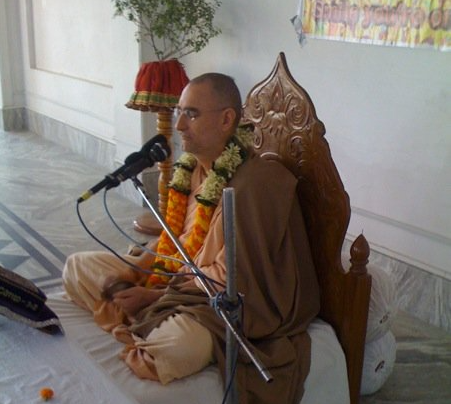So, everything, even if it’s immediate, it still has to be connected all the way back. That’s why it says, Kṛṣṇa is the ultimate goal, the ultimate. Because so many goals… It’s just like, okay, you want to eat lunch. So, okay, the immediate goal is to sit down in the chair, right? And so, therefore, to sit down in the chair, I have these options that I could do. And then within that, well, the tactical is that, well, okay, to get there I can’t walk through these two devotees, I am going to have to walk around. Now, the technical is going to be, do I walk quick, slow and that? How I put my feet, you know, which one I step with first, how I get around? You know, like this. Do I just go straight around and ignore them, or do I go by and smile and kind-of turn, and then kind-of plunk myself down? And so, I just described the whole strategic planning on how to get into that chair. Do you understand? So, this is the problem, is that if one doesn’t understand, strategy means making pure devotees, you don’t really understand strategic planning, literally. Because it’s a system that you apply in everything. I want to pick my nose, it’s still, it’s the thing, the goal is to pick my nose. Okay, so what can I… How am I going to do that? Okay, so what are the options? Well, you have to use something that fits into your nostril. Okay, my big toes won’t do that. The other four digits will, though it’s very hard, I don’t have the flexibility of a kid or a monkey. So, okay, I have to forget about the toes. So now that leaves ten of these fingers, like this. Thumbs are too big, okay, that leaves me eight fingers, right? Now, okay, now I’ve chosen, okay, now which of the fingers do I want to use? I’m going to use this finger here, okay. So now my operational is complete. Now, what’s the tactical about that? How am I going to put in my nose? And then the technique is, when it’s in your nose, how are you going to move… Do you understand? So sometimes this strategic planning, they make so much of a big ‘ta-da’ about it. But it’s as simple as that. But if it doesn’t go up to the actual strategy, which is pure devotional service, it’s not real strategic planning. It’s real, I mean, but it’s not real.


Comments